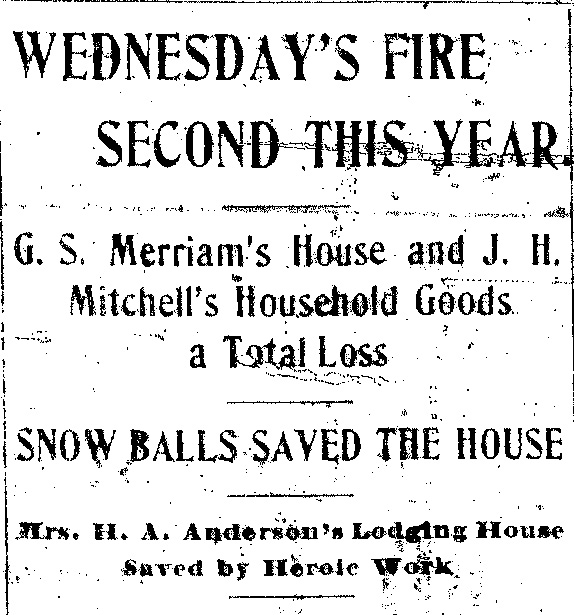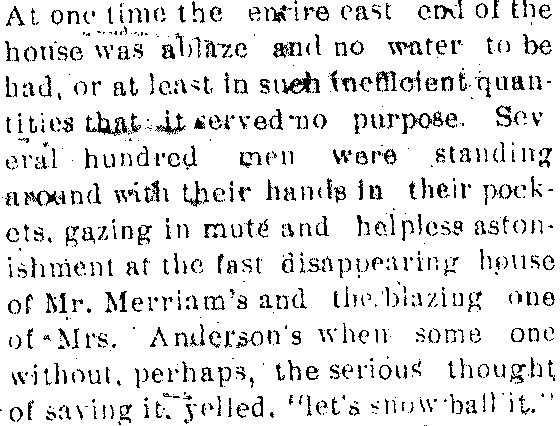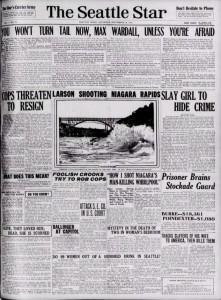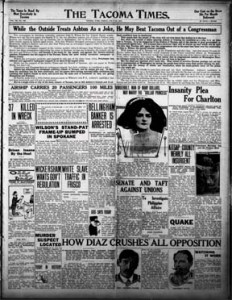 From the desk of Steve Willis, Central Library Services Program Manager of the Washington State Library:
From the desk of Steve Willis, Central Library Services Program Manager of the Washington State Library:
This entertaining bit of creative thinking was covered by the Leavenworth Echo, March 25, 1904, page 3:
WEDNESDAY’S FIRE SECOND THIS YEAR
G.S. Merriam’s House and J.H. Mitchell’s Household Goods a Total Loss
SNOW BALLS SAVED THE HOUSE
Mrs. H.A. Anderson’s Lodging House Saved by Heroic Work
“As if to show how utterly this town is at the mercy of the elements, and how entirely helpless its people are at a fire Leavenworth had a recurrence of what has happened here several times before, only in this case it was not such a serious matter, and but for the fact that the fire broke out in the daytime, with people all around, and heroic work it might have been worse.”
“On Wednesday afternoon, just a few minutes after six o’clock an alarm of fire attracted attention to Mrs. H.A. Anderson’s lodging house near the Congregational church.”
“The facts, as near as can be ascertained are that Mrs. Mitchell, who lived in a three roomed cottage about twelve or fifteen feet from Anderson’s house, went over to a neighbor’s house for a few moments before the fire broke out and left a good fire in the heater, which is one of those air tight stoves with all drafts turned off. The gas accumulated and an explosion followed, or at least someone heard what sounded like an explosion and immediately after flames shout out of the building. With the exception of a trunk and a few bed clothes all of the household goods of J.H. Mitchell were destroyed, on which there was no insurance. Mr. Mitchell is night watchman at the Lamb-Davis Lumber mill and left to go to his work not ten minutes before the fire broke out. The building, which belonged to G.S. Merriam, was partially insured.”

“Mrs. Anderson’s lodging house, which is a large and substantial frame structure and stood only about ten or fifteen feet from the house which burned was only saved by the hardest kind of work. At one time the entire east end of the house was ablaze and no water to be had, or at least in such inefficient quantities that it served no purpose. Several hundred men were standing around with their hands in their pockets, gazing in mute and helpless astonishment at the fast disappearing house of Mr. Merriam’s and the blazing one of Mrs. Anderson’s when some one without, perhaps, the serious thought of saving it, yelled, ‘let’s snow ball it.’ The suggestion was taken up at once by the crowd, which appeared to be waiting for someone to tell them what to do, and in much less time than it takes to tell it the end of the house was hit by thousands and thousands of snow balls from the hands of men and boys. To the writer it was an odd sight to see men and boys throwing snow balls with all theirmight, with an earnest, serious look on their faces. Snow balling is usually done amid shouting and laughing, but here all was quiet as a funeral. It soon became evident that the snowballs were having an effect and soon where a few moments before the entire end of the house was ablaze, there appeared a black charred and smoking surface. The fire had, however, made enough headway so that it had begun to burn under the cornice where it could not be reached with snowballs. A ladder was finally procured and some men got upon the roof and by tearing away the shingles a few buckets of water put out the last bit of fire that was left.”
“Mrs. H.A. Anderson, a most estimable widowed lady who owned and kept the house, was once before burned out in Leavenworth, and at that time had no insurance. Her loss on building and household goods will amount to five or six hundred dollars, which is covered by insurance. She expressed great satisfaction and was very thankful for the heroic work that was done in saving her house.”
“A report got out that Mrs. Mitchell’s baby had been left in the house and was burned up, but this it was learned was not so as she had taken it with her when she went to the neighbors.”
The Leavenworth Echo is still with us, and as any library cataloger will tell you, it is nothing short of astonishing that it has kept the same title since 1904. We have nearly a complete run in the collection, issues from 1904-1995 are on microfilm and can be sent to your library via inter-library loan.
Also, thanks to WSL’s participation in the National Digital Newspaper Program, historic issues of the Leavenworth Echo from 1904-1922 are available online.
Mrs. Anderson’s Lodging House also still exists in Leavenworth, and is called, oddly enough, Mrs. Anderson’s Lodging House. It is “now the oldest commercial wood frame building in Leavenworth,” thanks to the quick thinking of the snowball thinker upper in the crowd back in 1904.







